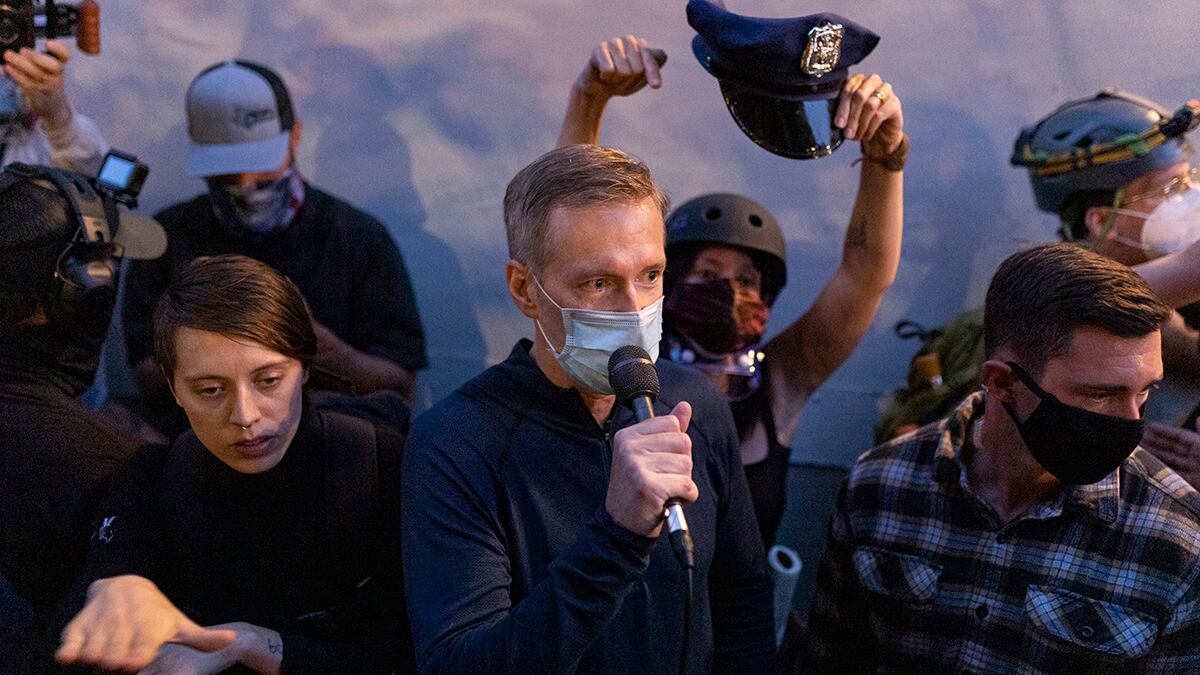Mayor Ted Wheeler has injected some life into his reelection campaign with a $150,000 personal loan.
That decision comes after a summer in which the incumbent raised almost no money, leaving him well behind his November opponent, Sarah Iannarone, in fundraising totals.
"Mayor Wheeler chose early in his campaign not to take taxpayer dollars to finance his reelection," campaign manager Danny O'Halloran said in a statement.
"He understood that this put him at a competitive disadvantage when it came to fundraising. As the incumbent mayor, this decision regarding his campaign ensures that his time is spent addressing the needs of the city and continuing to work every day putting the interests of Portlanders first. This allows him to serve Portlanders as a full-time mayor during a time of multiple crises and still maintain a campaign."
But Iannarone's campaign manager, Gregory McKelvey, says Wheeler's loan violates campaign finance limits Portland voters approved in 2018.
"Wheeler's loan to his own campaign is a blatant violation of the city charter and election laws that over 87% of Portlanders voted to adopt," McKelvey says. "After countless fines from the city auditor, the mayor has shown us that he believes himself above the law. This desperate attempt to buy an election must not be overlooked."
Opponents of the 2018 campaign finance limits challenged them in the Oregon Court of Appeals.
That challenge meant the limits did not go into effect immediately. But in April, the Court of Appeals ruled the limits to be legal and sent the case back to Multnomah County Circuit Court.
City elections officials then began enforcing most—but apparently not all—of the provisions May 3, 2020.
That enforcement has led to a slew of violations, including several by Wheeler's campaign, as candidates adjust not only to the limits but also new rules on disclosure.
The issue of how much candidates can loan their own campaigns, however, remains unsettled.
Jason Kafoury, a Portland lawyer who was one of the architects of the 2018 campaign finance limits, says details of how the limits will be enforced was the subject of a hearing last week in front of Multnomah County Circuit Judge Eric Bloch.
But Kafoury says he believes candidates should be observing that limit.
"It's our position the limit is in effect," Kafoury tells WW.
Wheeler's campaign attorney, however, says the U.S. Supreme Court ruled in 1976 in Buckley v. Valeo that candidates can self-fund, and that case has remained the governing precedent ever since.
Including the $150,000 loan, Wheeler has raised just $450,000 this year and has $169,000 in cash on hand. Iannarone, who is using the city's public financing program, which matches the first $50 contributors give her by 6 to 1, has raised $617,000 in 2020 and has $213,000 on hand.
Updated at 10:50 on Oct. 1: The city auditor's office, which enforces city election rules explained in an emailed statement its position on the self-funding limits included in the 2018 campaign finance measure.
"The Auditor's Office is not currently enforcing the limit on self-financed campaigns because the U.S. Supreme Court has consistently and soundly rejected any limit on a candidate's expenditure of his or her own funds to finance a campaign," wrote Louise Hansen of the auditor's office.
Dan Meek, one of the architects of the 2018 measure, disagrees with that stance. Meek says that in a Multnomah County Court proceedings last week, the city and proponents of the limits agreed on an order than would include enforcement of the $5,000 limit—but Judge Eric Bloch has not yet signed that order.

